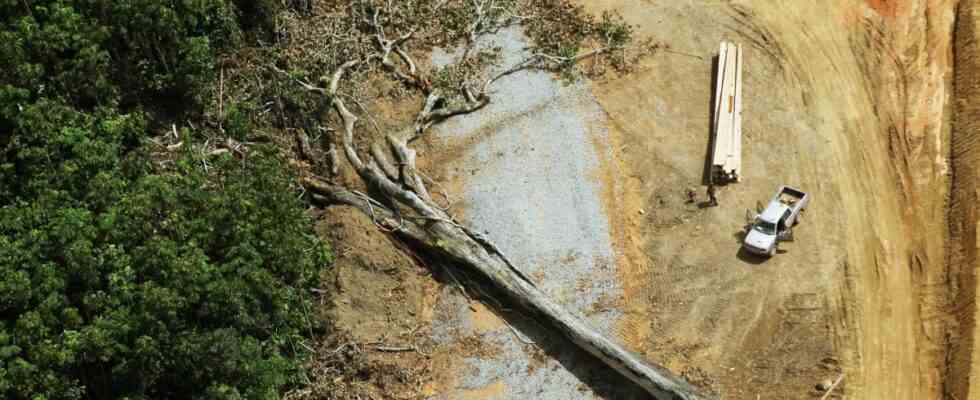Forest destruction is often measured in terms of the size of soccer fields, so that people can better understand it. A soccer field every 90 seconds – that’s how much tropical forest is disappearing because the countries of the European Union are importing products such as soya, palm oil and rubber. With a corresponding installation in Berlin’s Hans Zoschke Stadium, environmental organizations made the extent of the destruction clear at the beginning of this year. The European Union now wants to combat this so-called “imported deforestation” – with quite remarkable results in a very short time, at least by EU standards.
European companies should be obliged to ensure “deforestation-free supply chains”. This is what it says in a draft law that the Commission presented in November last year. At the end of June, the member states agreed to support the draft, albeit with some weakening. This Tuesday, the environment committee of the European Parliament passed its position on the law. A large majority of Social Democrats, Christian Democrats, Liberals, Greens and Leftists are calling for tightening of essential points.
The final negotiations of the three institutions (called: trilogue) are to begin in September. And there is certainly hope that a “milestone” will be reached in the fight for biodiversity and against climate change, says MEP Delara Burkhardt from the SPD, who is chief negotiator for the Social Democratic group.
Companies must prove the origin of their raw materials
The 29-year-old from Kiel, who was only elected to the European Parliament in 2019, was responsible for a so-called initiative report by the European Parliament on the subject in 2020. The main demand: the Commission should say goodbye to its plan to combat deforestation through a certification system. In such systems, companies that want to guarantee their customers certain standards must acquire a label – in this case: “deforestation-free”. Ultimately, the purchase decision rests with the consumer.
The parliamentary report proposed imposing due diligence obligations on companies as the main tool in the fight against deforestation. Delara Burkhardt thinks it’s “very cool” that these obligations are now actually part of the law and that the protection of the forest is becoming the norm on the European market.
Any deforestation that is involved in imports for the European market, regardless of whether it happens legally or illegally in the country of origin, should be stopped with the law. Companies must use geolocation data to prove the origin of their raw materials. They need to gather information about deforestation risks and related human rights abuses in their supply chains and take action to address them. Otherwise there is a risk of penalties or exclusion from the market.
Environmental activists criticize that the law still leaves “more holes than Swiss cheese”. Delara Burkhardt takes the criticism seriously, but points out that there are still many holes that can be plugged in the negotiations with the Council.
There is a dispute over the scope of the law. Palm oil, beef, wood, coffee, cocoa and soy as well as a number of derived products – such as leather or furniture – are to be covered by the law. Parliament wants to ensure that rubber and corn are added.
First the rainforest, then the savannah?
There are also debates about how tightly companies should be controlled. A benchmarking system will provide orientation as to how high the risk of “deforestation” is in the respective states, whether European or otherwise. The Commission wants to have 15 percent of the products checked in the countries with the highest risk, Parliament even 20 percent – the member states, on the other hand, only five percent.
A third major point of contention: What is “forest degradation” actually? The member countries have decided on a definition that only includes the damage to primeval forests, of which there are hardly any left in Europe. Parliament wants a “broader definition” that also makes European forestry responsible.
There will be no majority for examining the investments of banks and insurers under the criterion of “deforestation”. At some point, the question will also arise as to whether the law should be extended to other ecosystems. If, for example, it is possible to protect the rainforest, the pressure will increase to use the savannah for agricultural purposes. In any case, the struggle to preserve the forest will continue, soccer field by soccer field.

